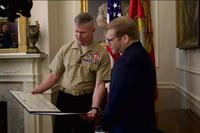They came flush with cash, packed with cutting-edge equipment, and were led by the field's best-known figure -- the man who discovered the Titanic.
But a high-profile exploration of ancient shipwrecks has ended suddenly, with one of its central goals abandoned.
Excitement ran high when Robert Ballard -- the legendary underwater explorer who found the Titanic, the German battleship Bismarck and John F. Kennedy's PT-109 -- announced his summer mission off the shores of Turkey and Egypt.
It wasn't just that Ballard and his crew were going to explore some of the oldest shipwrecks ever found during this $7 million mission. They were going to do it with the first robot ever designed for deep-sea archeology and with watch commanders directing parts of the expedition from thousands of away.
"In 1981, I sketched out a vision of the future of undersea exploration," Ballard said before the expedition began in August. "And it's exactly what we're going to do in a week."
But international politics have a way of overwhelming ambitious goals and sophisticated technologies. After scrambling to straighten out visa problems in Turkey, which kept his crew stuck on a dock for two days, Ballard ran into a roadblock from the government of Egypt.
Although the researchers say several of their most important aims were met, including successful tests of their mechanical archeologist, named Hercules, the entire Egyptian portion of the expedition had to be scrapped.
My story in today's Chicago Tribune explores how this ambitious adventure to the depths went awry.
POLITICS SINKS EXPLORATION OF ANCIENT WRECKS
© Copyright 2024 Military.com. All rights reserved. This article may not be republished, rebroadcast, rewritten or otherwise distributed without written permission. To reprint or license this article or any content from Military.com, please submit your request here.








